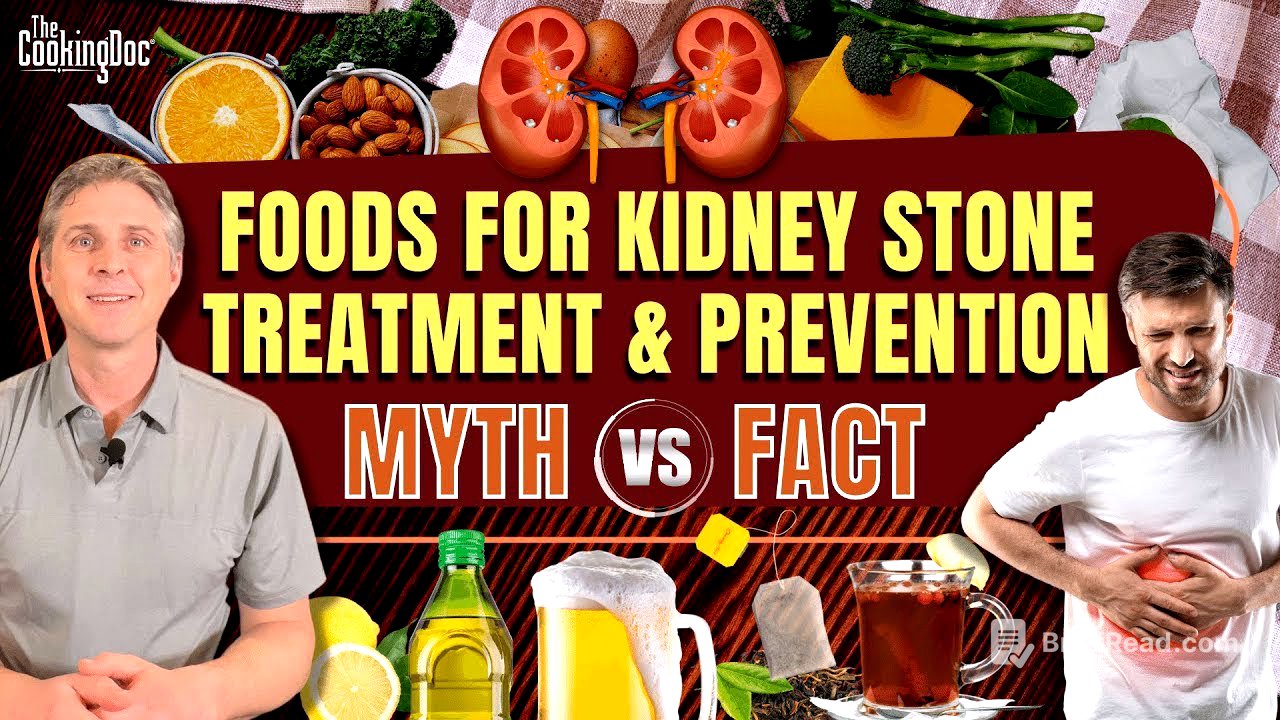TLDR;
This video addresses and debunks five common myths about kidney stones, offering evidence-based insights. It clarifies misconceptions around beer, lemon juice, tea, calcium intake, and olive oil, providing viewers with accurate information to manage and prevent kidney stones effectively.
- Beer does not dissolve kidney stones.
- Lemon juice is not a long-term solution for kidney stones.
- Tea does not increase the risk of kidney stones.
- Eating less calcium does not help prevent kidney stones.
- Olive oil does not help pass kidney stones.
Introduction [0:00]
Dr. Blake Shusterman introduces the topic of kidney stones, highlighting their painful nature and potential for long-term kidney damage, hospitalizations, and infections. He emphasizes the importance of relying on scientifically-backed, doctor-approved information rather than unverified advice found online. The video aims to debunk five common untrue beliefs about kidney stones that he frequently encounters in his practice.
Kidney Stone Myth vs Fact [0:42]
Dr. Shusterman addresses the prevalence of misinformation regarding kidney stones and stresses the importance of consulting reliable sources for accurate information. He cautions against following advice from individuals without medical training who may promote unscientific remedies or supplements. The video aims to clarify common misconceptions and provide viewers with evidence-based insights for managing kidney stones.
Does Beer Dissolve Kidney Stones? [2:25]
The myth that beer dissolves kidney stones is addressed and debunked. Despite a small study suggesting beer drinkers might be slightly less prone to kidney stones, there's no evidence that beer dissolves existing stones or aids their passage. Beer, essentially becoming water by the time it reaches the kidneys, can worsen the situation by causing urine backup behind a stuck stone, increasing pain due to pressure.
Does Lemon Juice Cure Kidney Stones? [3:27]
The idea that lemon juice can cure kidney stones is explored, noting its basis in the half-truth that lemon juice contains citrate, which can bind to calcium and prevent stone formation. However, a 2021 study showed that while initial improvements in stone recurrence were observed with two ounces of daily lemon juice, many participants couldn't tolerate this amount long-term due to stomach issues. The study concluded that it's not a sustainable solution, and a higher dosage may be needed. Dr. Shusterman recommends consulting a doctor about potassium or sodium citrate pills or considering drinks like Moonstone, developed by a nephrologist, to provide sufficient citrate without adverse effects.
Will Drinking Tea Increase the Risk for Kidney Stones? [5:40]
The claim that tea increases the risk of kidney stones due to its high oxalate content is examined. While it's true that teas, especially black teas, contain oxalates, a 2021 study challenges this idea. The study found no difference in urinary oxalate levels between men who consumed fruit tea (no oxalate) and those who drank black tea (high oxalate). This puts into question the belief that oxalate teas increase kidney stone risk, unless consumed in very large quantities.
Can Eating Less Calcium Help Prevent Stones? [6:55]
The idea that eating less calcium helps prevent calcium stones is refuted. Eating less calcium can worsen the condition by increasing oxalate absorption, paradoxically raising the risk of oxalate stones. Adequate calcium intake is necessary to prevent calcium stones from forming.
Does Olive Oil Help Pass Kidney Stones? [7:34]
The notion that olive oil can grease the ureters and help pass kidney stones is dismissed as ridiculous. There is no mechanism by which olive oil could enter the urine and create a slippery passage to facilitate stone passage.
Conclusion [7:55]
Dr. Shusterman summarizes the five debunked myths about kidney stones. He advises viewers with kidney stones to consult their doctor and recommends Melanie Betts at thekindeydietitian.org for up-to-date information. He also promotes his book, "The Cooking Doc's Kidney Healthy Cooking," as a resource for preventing and managing kidney disease through diet.







![[제40회 골든디스크] 디지털 음원 본상 - JENNIE (제니)](https://wm-img.halpindev.com/p-briefread_c-10_b-10/urlb/aHR0cDovL2ltZy55b3V0dWJlLmNvbS92aS9hVlpuYkJsZFdZUS9ocWRlZmF1bHQuanBn.jpg)
